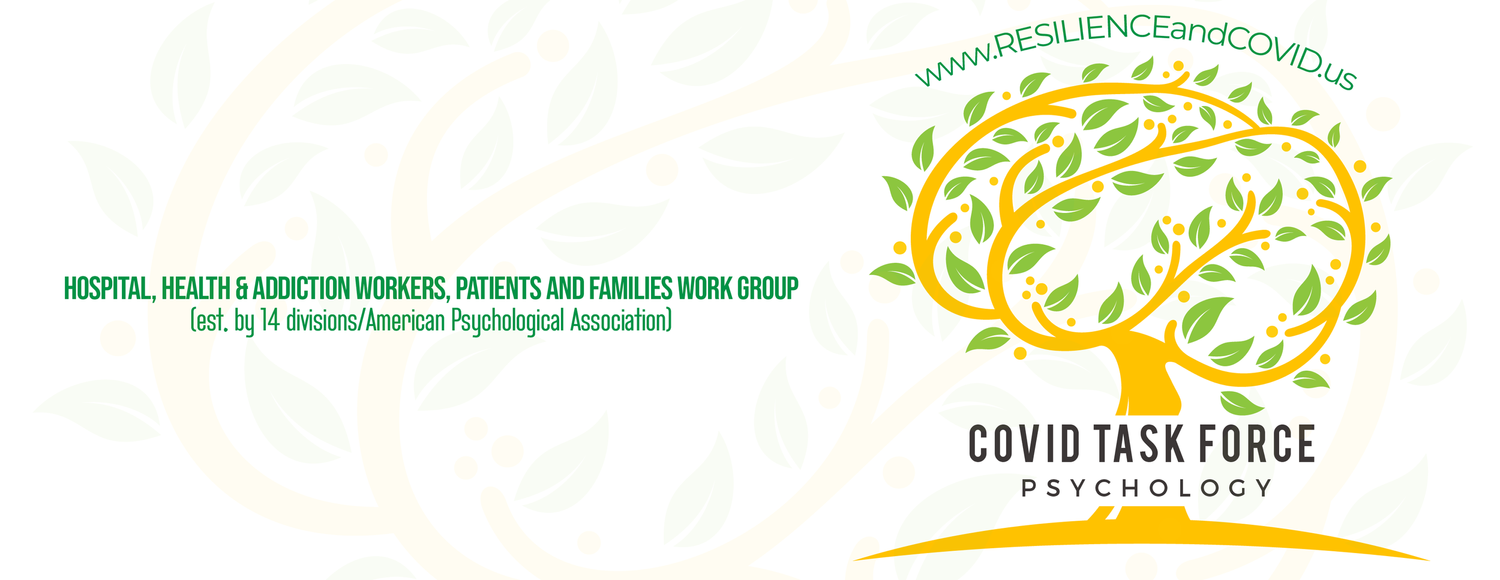Our Mission
As the Hospital, Health and Addiction Workers, Patients and Families working group of the COVID-19 Psychology Task Force (established by 14 divisions of the American Psychological Association), our mission is to reduce and when possible, prevent, COVID-related psychological trauma, and to facilitate developing resiliency and even post-traumatic growth.
Our hope is to reach those facing the ordeal of grief and loss, anxiety, depression, vicarious trauma, moral injury, compassion fatigue, suicide, and other negative psychological sequelae wrought by this pandemic of COVID-19, which is also fueling the continuing opioid epidemic.
Our primary goal became to provide information, education, and training to help hospitals and addiction and health care facilities recognize and handle the psychological needs of all facing this pandemic.
We worked to assemble what was already known or rapidly being developed by others, while creating our own resources to fill in the noticeable gaps, assisting health care leadership as well as the “unsung heroes” such as janitorial and dietary staff. In order to make an immediate impact, we are compiling information in several languages.
Who we are:
Hospital, Health and Addiction Workers, Patients and Families working group of the COVID-19 Psychology Task Force (established by 14 divisions of the American Psychological Association)
Members of the Trauma Division of the American Psychological Association (APA)
Experts in psychological trauma
Experienced in medical, addiction, and other clinical settings
Our blog:
Psychological Trauma, Coping, and Resilience: COVID-19 and pandemics
Our goal is to support:
Frontline staff as they cope with overwhelming psychological experiences.
“Unsung heroes”—the nonmedical essential workers such as housekeeping, dietary, and administrative staff —as they cope with the stresses of working in COVID-19 facilities.
Healthcare leaders in embracing a psychologically informed leadership.
Mental health, addiction, and spiritual practitioners in helping their patients.
Mental health, addiction, and spiritual practitioners in relieving their own compassion fatigue and burnout.
Frontline staff and healthcare leadership in avoiding burnout.
People with COVID-19 as they cope with their illness experiences.
Families of those affected personally or professionally by COVID-19 in helping their family member while coping with the family dynamics resulting from the illness.
About this site
As the Hospital, Healthcare and Addiction Workers, Patients and Families working group of the COVID-19 Psychology Task Force (established by 14 divisions of the American Psychological Association), our mission is to reduce and when possible, prevent COVID-related psychological trauma, and to facilitate developing resiliency and even post-traumatic growth.





